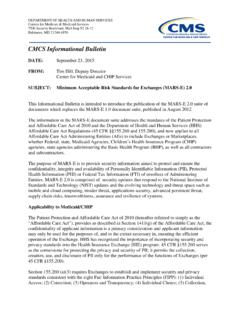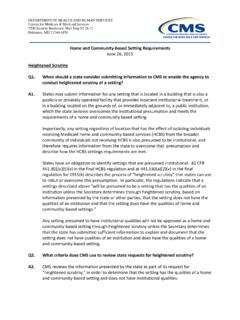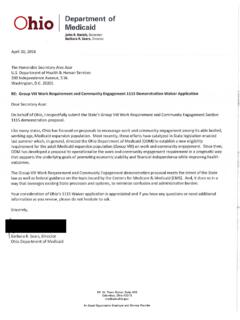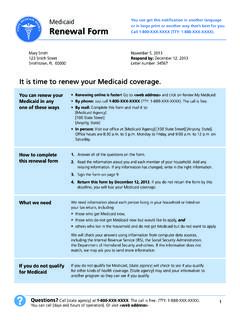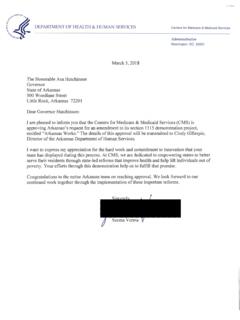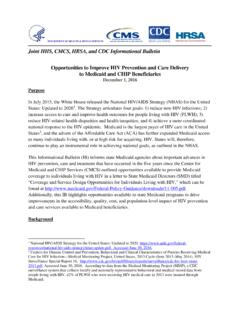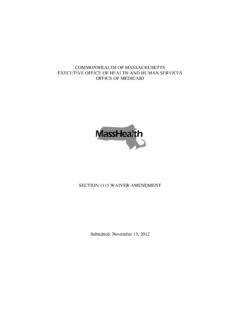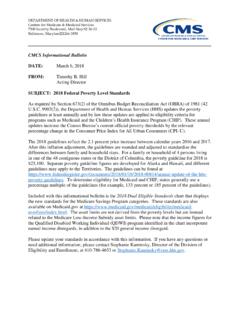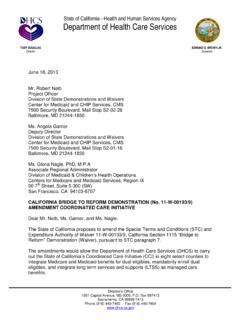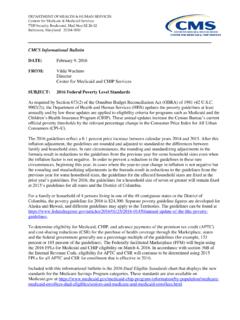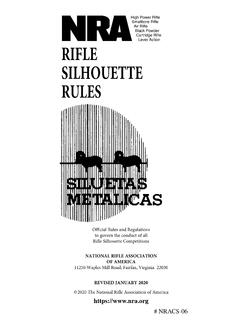Transcription of DEPARTMENT OF HEALTH & HUMAN SERVICES
1 The contents of this document do not have the force and effect of law and are not meant to bind the public in any way, unless specifically incorporated into a contract. This document is intended only to provide clarity to the public regarding existing requirements under the law DEPARTMENT OF HEALTH & HUMAN SERVICES Centers for Medicare & Medicaid SERVICES 7500 Security Boulevard, Mail Stop S2-26-12 Baltimore, Maryland 21244-1850 SHO # 21-008 RE: Medicaid Guidance on the Scope of and Payments for Qualifying Community-Based Mobile Crisis Intervention SERVICES December 28, 2021 Dear State HEALTH Official.
2 The Centers for Medicare & Medicaid SERVICES (CMS) is issuing this guidance on the scope of and payments for qualifying community-based mobile crisis intervention SERVICES authorized by section 9813 of the American Rescue Plan Act of 2021 (ARP) (Pub. L. 117-2). Overview Section 9813 of the ARP amends Title XIX of the Social Security Act (the Act) to add a new section 1947. Section 1947 authorizes a state option to provide qualifying community-based mobile crisis intervention SERVICES for a period of up to five years, during the period starting April 1, 2022, and ending March 31, 2027.
3 States that have approved coverage and reimbursement authority through the state plan, section 1915(b) waiver programs with corresponding authority, section 1915(c) home and community-based SERVICES waiver programs, or section 1115 demonstration projects may receive an 85 percent federal medical assistance percentage (FMAP) for expenditures on qualifying community-based mobile crisis intervention SERVICES for the first 12 fiscal quarters within the five-year period during which they meet the conditions outlined in statute to qualify for the increased match .
4 Section 9813 of the ARP permits states to disregard Medicaid requirements for statewideness at section 1902(a)(1), comparability at section 1902(a)(10)(B), and free choice of provider at section 1902(a)(23)(A) of the Act as part of their submission. Additionally, the statute permits states to disregard the provider agreement requirements at section 1902(a)(27) of the Act that obligate states to enter into provider agreements with every person or institution providing SERVICES under the State plan. Background The DEPARTMENT of HEALTH and HUMAN SERVICES (HHS) has long recognized the importance of providing access to qualified professionals who can respond in real-time to mental HEALTH and substance use disorder (SUD) crises.
5 Community-based mobile crisis intervention SERVICES are a key element of an effective behavioral HEALTH crisis continuum of care. The main objectives of community-based mobile crisis intervention SERVICES are to provide rapid response, individual assessment and crisis resolution by trained mental HEALTH and substance use treatment professionals and paraprofessionals in situations that involve individuals who are presumed or Page 2 State HEALTH Official The contents of this document do not have the force and effect of law and are not meant to bind the public in any way, unless specifically incorporated into a contract.
6 This document is intended only to provide clarity to the public regarding existing requirements under the law known to have a mental HEALTH condition and/or SUD. With the provision of these intervention SERVICES , individuals can be linked to needed SERVICES , such that psychiatric hospitalizations, including hospitalizations that follow psychiatric emergency DEPARTMENT (ED) admissions, can be Additionally, mobile crisis teams can respond to situations that require their SERVICES rather than those of law enforcement .2 Programs providing community-based mobile crisis intervention SERVICES in the United States have been operating since the late 1980s and early Mobile Crisis Systems The Substance Abuse and Mental HEALTH SERVICES Administration (SAMHSA) frames a successful mobile crisis system as one that: helps individuals experiencing a crisis event experience relief quickly and resolve the crisis situation when possible; meets individuals in an environment where they are comfortable.
7 And provides appropriate care/support while avoiding unnecessary law enforcement involvement, ED use and hospitalization. In its National Guidelines for Behavioral HEALTH Crisis Care A Best Practice Toolkit and its 2021 publication, Meeting Needs, Savings Lives, SAMHSA offered a set of minimum expectations and best practices to operate a mobile crisis ,5 The SERVICES should be provided where the person is experiencing a crisis (home, work, park, etc.) and not be restricted to select locations within the region or particular days/times.
8 Mobile crisis SERVICES should connect individuals to facility-based care as needed, through warm hand-offs and coordinating transportation only if situations warrant transition to other locations. The SAMHSA National Guidelines for Behavioral HEALTH Crisis Care describe three core components of a robust crisis system where people do not fall through the cracks of a fragmented system, as follows: (1) a 24/7 clinically staffed call center that can serve as the hub of an integrated mental HEALTH crisis system; (2) mobile crisis response teams that can respond rather than law enforcement, and (3) crisis receiving and stabilization facilities that provide short-term SERVICES and can be accessed readily rather than relying on emergency departments or hospital environments.
9 A crisis continuum that functions well is intentionally inclusive of all residents of a community, including those from under-resourced areas. Best practices include incorporating trained peers who have lived experience in recovery from mental illness and/or SUD and formal training within the mobile crisis team; responding without law enforcement accompaniment, unless special circumstances warrant inclusion, in order to support justice system diversion; implementing real-time GPS technology in partnership with the region s crisis call center hub to support efficient connections to needed resources and tracking of engagement.
10 And scheduling outpatient follow-up appointments and SERVICES to connect to ongoing care and home and community-based SERVICES and supports. Community-based mobile 1 2 3 4 5 Page 3 State HEALTH Official The contents of this document do not have the force and effect of law and are not meant to bind the public in any way, unless specifically incorporated into a contract. This document is intended only to provide clarity to the public regarding existing requirements under the law crisis SERVICES use face-to-face professional and trained peer intervention, deployed in real time to the location of the person in crisis in order to achieve the best outcomes for that individual.
